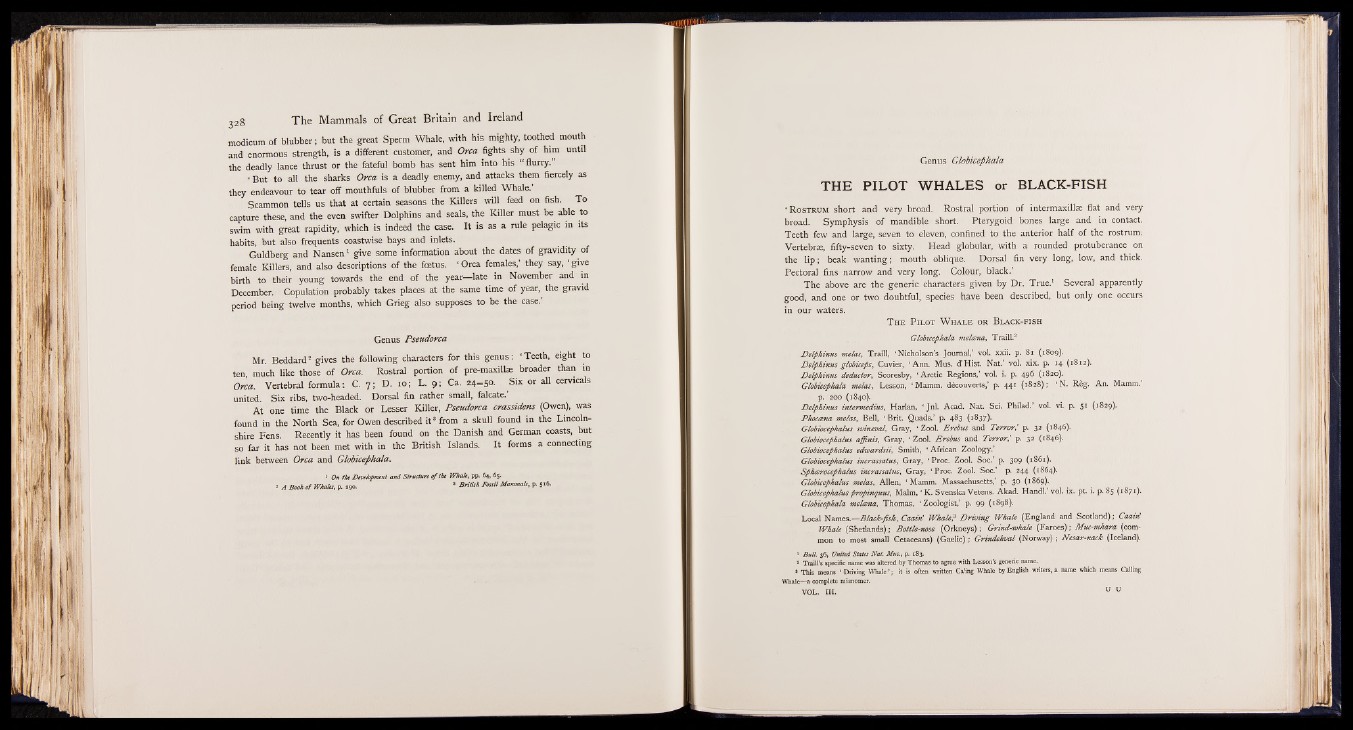
modicum of blubber; but the great Sperm Whale, with his mighty, toothed mouth
and enormous strength, is a different customer, and Orca fights shy of him until
the deadly lance thrust or the fateful bomb has sent him into his “ flurry.”
‘ But to all the sharks Orca is a deadly enemy, and attacks them fiercely as
they endeavour to tear off mouthfuls of blubber from a killed Whale.’
Scammon tells us that at certain seasons the Killers will feed on fish. To
capture these, and the even swifter Dolphins and seals, the Killer must be able to
swim with great rapidity, which is indeed the case. It is as a rule pelagic in its
habits, but also frequents coastwise bays and inlets.
Guldberg and Nansen1 give some information about the dates of gravidity of
female Killers, and also descriptions of the foetus. ‘ Orca females,’ they say, ‘ give
birth to their young towards the end of the year— late in November and in
December. Copulation probably takes places at the same time of year, the gravid
period being twelve months, which Grieg also supposes to be the case.
Genus Pseudorca
Mr. Beddard2 gives the following characters for this genus: ‘ Teeth, eight to
ten, much like those of Orca. Rostral portion of pre-maxillae broader than in
Orca. Vertebral formula: C. 7 ; D. 10; L. 9; Ca. 24=50. Six or all cervicals
united. Six ribs, two-headed. Dorsal fin rather small, falcate.
At one time the Black or Lesser Killer, Pseudorca crassidens (Owen), was
found in the North Sea, for Owen described i t ’ from a skull found in the Lincolnshire
Fens. Recently it has been found on the Danish and German coasts, but
so far it has not been met with in the British Islands. It forms a connecting
link between Orca and Globicephala.
1 On the Development and Structure o f the Whale, pp. 64, 65.
* A Book o f Whales, p. 290- * B ritish Fossil Mammals' P- 5 l6-
Genus Globicephala
T H E P IL O T W H A L E S or B L A C K -FISH
‘ Rostrum short and very broad. Rostral portion of intermaxillæ flat and very
broad. Symphysis of mandible short Pterygoid bones large and in contact.
Teeth few and large, seven to eleven, confined to the anterior half of the rostrum.
Vertebræ, fifty-seven to sixty. Head globular, with a rounded protuberance on
the lip ; beak wanting ; mouth oblique. Dorsal fin very long, low, and thick.
Pectoral fins narrow and very long. Colour, black.’
The above are the generic characters given by Dr. True.1 Several apparently
good, and one or two doubtful, species have been described, but only one occurs
in our waters.
T he Pilot W hale or Black-fish
Globicephala meleena, Traill.2
D elphinus mêlas, Traill, ‘ Nicholson’s Journal,’ vol. xxii. p. 81 (1809).
D elphinus globiceps, Cuvier, ‘ Ann. Mus. d’Hist. Nat.’ vol. xix. p. 14 (1812).
D elphinus deductor, Scoresby, ‘ Arctic Regions,’ vol. i. p. 496 (1820).
Globicephala mêlas, Lesson, 1 Mamm. découverts,’ p. 441 (1828); ‘ N. Règ. An. Mamm.
p. 200 (1840).
D elphinus intermedins, Harlan, ‘ Jnl. Acad. Nat. Sci. Philad.’ vol. vi. p. 5 1 (1829).
Phoccena mêlas, Bell, ‘ Brit. Quads.’ p. 483 (1837).
Globiocephalus svineval, Gray, ‘ Zool. E rebus and T erro rl p. 32 (1846).
Globiocephalus a ffin is, Gray, ‘ Zool. Erebus and T erro rl p. 32 (1846).
Globiocephalus edwardsii, Smith, ‘ African Zoology.’
Globiocephalus incrassatus, Gray, ‘ Proc. Zool. Soc.’ p. 3°9 (1861).
Spheerocephalus incrassatus, Gray, ‘ Proc. Zool. Soc.’ p. 244 (1864).
Globicephalus mêlas, Allen, ‘ Mamm. Massachusetts,’ p. 30 (1869)..
Globicephalus propinquus, Malm, ‘ K . Svenska Vetens. Akad. Handl. vol. ix. pt. i. p. 85 (1871).
Globicephala meleena, Thomas, ‘ Zoologist,’ p. 99 (1898).
Local Names.— B la ck-fish , Caain! Whale,3 D riv in g Whale (England and Scotland) ; Caain
Whale (Shetlands); Bottle-nose (Orkneys); Grind-whale (Faroes); Muc-mkara (common
to most small Cetaceans) (Gaelic) ; G rindehval (Norway) ; Nesar-nack (Iceland).
1 Bull. 36, United States Nat. Mus., p. 183.
* Trail’s specific name was altered by Thomas to agree with Lesson’s generic name.
» This means ‘ Driving Whale’ ; it is often written Ca’ing Whale by English writers, a name which means Calling
Whale—a complete misnomer.
VOL. III. u u